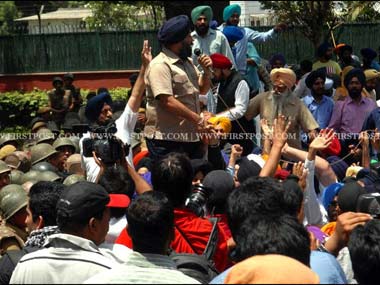Much has been said about the priorities for the new AAP government over the next six months. But commentators have not made much mention of what remains the greatest stigma on Delhi – the 1984 massacre of Sikhs and the subsequent response by the Indian state which is the most extreme case example of our administrative and legal system colluding in a denial of justice. This is an issue that figures in the AAP manifesto as a commitment to ‘providing justice to victims of 1984 riots’ and ’re-opening wrongly closed cases’. Directly there may seem to be little that the AAP government in Delhi can do. It probably cannot even announce another commission of inquiry because public order does not lie under the ambit of the Delhi government. But there is nothing to stop the party from setting up a time-bound consultative process with the citizens of Delhi on the steps that need to be taken urgently to ensure justice for 1984. These steps need to go beyond the re-opening of wrongly closed cases, they need to consider cases that were never filed in the first place or punish those indicted by previous commissions which would include many in the senior leadership of the Delhi Police. These concrete steps, along with similar proposals for what needs to be done for the victims of the 2002 killings in Gujarat, must then become part of its manifesto for the Lok Sabha elections. [caption id=“attachment_130452” align=“alignleft” width=“380”]  A protest by Sikhs against the acquittal of Sajjan Kumar in a 1984 anti-Sikh riots case. Firstpost[/caption] Focusing attention on the issue is what is necessary today, at a time when a great number of Congress supporters who have brought the term liberal into disrepute seek to dismiss the relevance of 1984, at a time when both Congress and BJP supporters play the your-killings-were-worse-than-ours game. The latest to join the fray is Amartya Sen, who argued that Congress leaders, Sonia Gandhi, Manmohan Singh and Rahul Gandhi, who were fighting elections today, were not the people responsible for the anti-Sikh riots. No one had accused them of that, whereas Modi was the chief minister when the riots took place. Moreover, he said that the anti-Sikh riots were not something that fitted into the Congress philosophy. “There is no philosophy of killing Sikhs in the Congress,” he told NDTV in an interview. Quite apart from the fact that it would come as no great relief to the families of victims that the deaths of their family members were not philosophically motivated, this is simply untrue. Since 1984 all those who collaborated in the violence have systematically been rewarded within the Congress, a process that has continued even today. Sajjan Kumar’s son was given the ticket for the recent Delhi elections and the recently announced chief of the Delhi Congress Arvinder ‘Lovely’ is the son of a man who distinguished himself in the city by his fervent attempts to ensure that HKL Bhagat was not blamed for the 1984 killings. The sins of the fathers must not visit the sons but how can they be ignored when the sons continue to benefit from the sins? When Amartya Sen talks of those fighting elections today, he forgets Kamal Nath who headed a mob that burnt two Sikhs to death outside Gurdwara Rakabganj within sight of Parliament. What explains such amnesia, or the inability to acquaint himself with even a semblance of the truth in a scholar such as Amartya Sen? The same amnesia is evident in a book written by his good friend, the philosopher Martha C Nussbaum, who actually has stated that ‘rape and killing-by-incineration were not central elements of the violence’ in 1984. And there was no gas in the gas chambers Ms Nussbaum? From high philosophy to trivial commentary these sentiments abound, without provoking the outrage they would have if they were made about a party other than the Congress. In the Business Standard Mihir S Sharma, whose bias in this matter borders on the communal, actually went on to argue that he would consider 1984 relevant today ‘when I see a spate of attacks on Sikhs by Congressmen across north India in 2013’. This denial of the truth by otherwise respected members of the secular class in Delhi is understandable. Long years of social commonality through collegial friendship or interactions that start as professional linkages between bureaucrats and Congress politicians and then go down generations have tied together Delhi’s secular elite with a certain section of the Congress leadership. This is the elite that is often represented in most of the well-heeled NGOs, in certain TV channels, or the opinion writing section of the media. This is the elite that can’t tell the difference between being liberal and being supportive of the Congress. This is also the elite that is paving the way for Narendra Modi, much as the hollowness of the secular elite in Turkey paved the way for an autocrat and demagogue such as Recep Tayyip Erdogan. In such a climate the AAP must set itself up as a liberal force devoid of this baggage. And taking up 1984 in well thought out fashion is one way of beginning to do so. The case for ensuring justice in incidents of communal violence must begin with 1984. To be able to obtain justice for the violence of 2002 in Gujarat without addressing 1984 will always leave us open to charges of selective justice, on the other hand, if justice for 1984 is ensured, justice for 2002 will have to follow. This is a cause that goes well beyond electricity bills and the Commonwealth Games scam, are you up to the challenge Arvind?
AAP must set itself up as a liberal force devoid of any baggage. Ensuring justice for the violence of 1984 in well thought out fashion is one way. Justice for 2002 will follow.
Advertisement
End of Article


)
)
)
)
)
)
)
)
)



